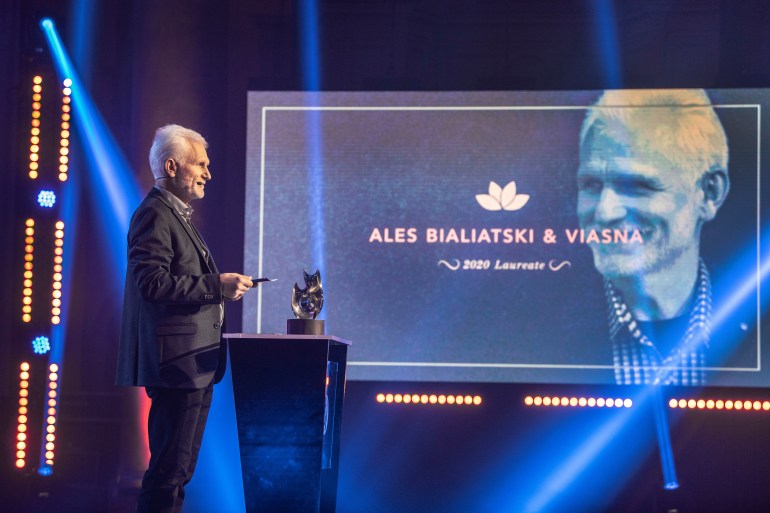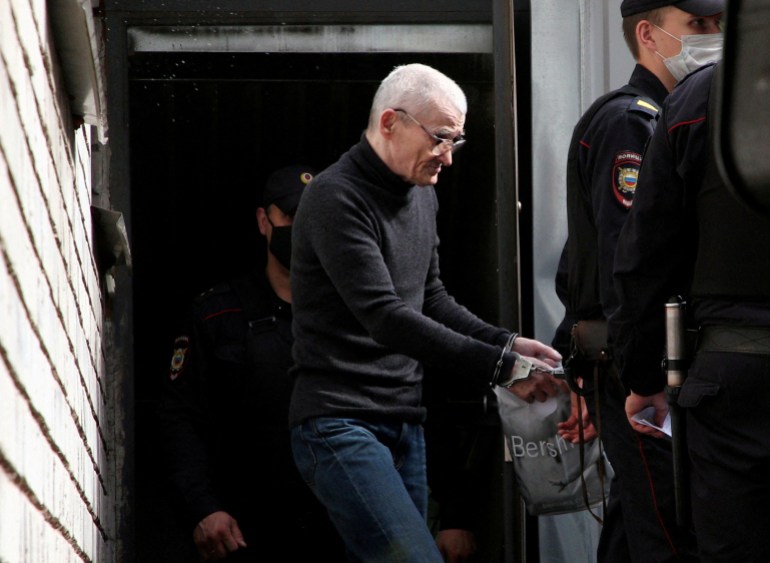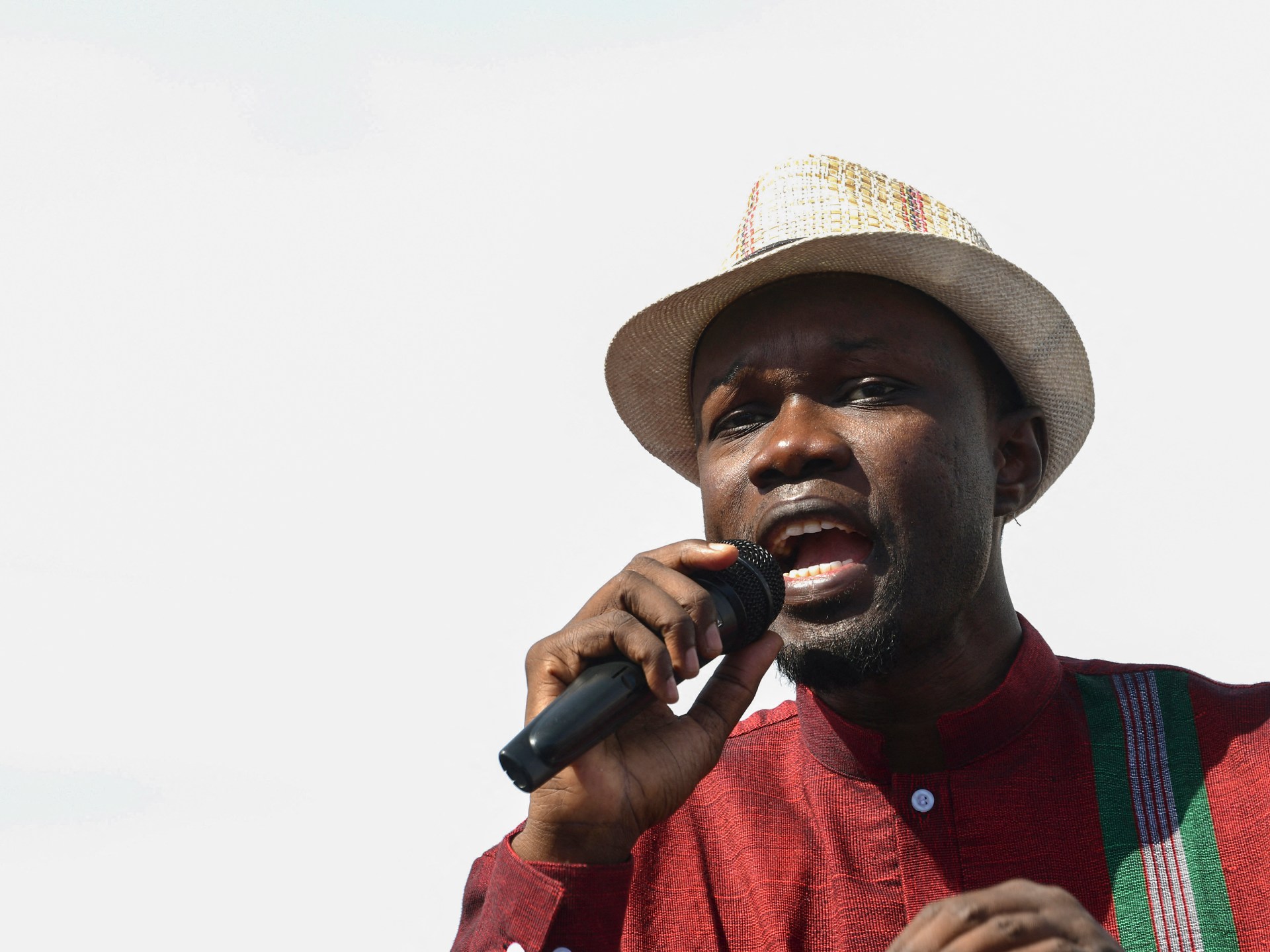Nobel Peace Prize winners to receive award in Oslo | News
This year’s Nobel Peace Prize will be presented on Saturday to Belarusian, Russian, and Ukrainian activists for promoting the right to criticise power and protect the fundamental rights of citizens.
Jailed activist Ales Bialiatski from Belarus, the Russian organisation Memorial, and the Ukrainian Center for Civil Liberties group were announced as recipients in October.
Al Jazeera will be live from Oslo, Norway, to speak to Natallia Pinchuk, Bialiatski’s wife, Jan Rachinsky from Memorial, and Oleksandra Matviichuk from Ukraine’s Center for Civil Liberties about the importance of civil society in a time of war, and the challenges and dangers activists face doing their job.
The award, worth about $900,000, will be handed out on the anniversary of the death of Swedish industrialist Alfred Nobel, who founded the awards in 1895.
In its citation, the Norwegian Nobel Committee said the recipients “made an outstanding effort to document war crimes, human right abuses and the abuse of power”.
“Together they demonstrate the significance of civil society for peace and democracy,” it said.
Here is a look at who the recipients are and why their work matters:
Ales Bialiatski
Prominent Belarusian human rights activist Bialiatski is the fourth laureate to win the Nobel Peace Prize while behind bars.
The founder of leading rights group Viasna had been at the forefront of attempts to document the abuses committed by the government of Belarusian President Alexander Lukashenko, described in the West as Europe’s last dictator.
Bialiatski, 60, was jailed in July 2021 following massive street protests over a national vote that kept Lukashenko in power for a sixth term the previous year.
His organisation documented the use of torture against political prisoners by Belarusian authorities and provided support to jailed demonstrators and their families.

Shortly before being arrested, Bialiatski condemned the crackdown, saying local authorities were “acting as a regime of occupation”.
Bialiatski had earlier spent three years in prison after being convicted in 2011 of tax evasion, charges he denied. His supporters consider the arrest an attempt to silence him.
Under Lukashenko’s rule, which began in 1994, the human rights group unsuccessfully applied for registration twice.
Despite the lack of formal recognition, Viasna’s activities won numerous international awards, including the US Atlantic Council’s Freedom Award.
Bialiatski was twice nominated for the Nobel Peace Prize, in 2006 and 2007.
Memorial
One of the oldest and most respected human rights groups in Russia, Memorial was co-founded by physicist and Nobel Peace Prize laureate Andrei Sakharov in 1987 to uncover and reveal the horrors of Soviet oppression.
This mission was viewed as treasonous by Russian President Vladimir Putin.
The organisation was shut down by a court order in December 2021 on the grounds of violating the “foreign agents” law. It continued operating without official registration, documenting Russia’s totalitarian past and organising educational initiatives to spread awareness among the population.
According to the Norwegian Nobel Committee, Memorial’s work “is based on the notion that confronting past crimes is essential in preventing new ones”.
Its Human Rights Centre was the subject of a legal battle earlier this year as the government attempted to seize it on the grounds it justified “terrorist activities”.
In 2020, a court increased the sentence of historian Yuri Dmitriev, who chaired Memorial’s branch in the northern Republic of Karelia, from 3.5 to 13 years of imprisonment.
He was found guilty of sex abuse charges in a sentence widely seen as retaliatory after he uncovered evidence of a mass burial site used by Soviet leader Joseph Stalin’s secret police.
Dmitriev remains in detention in a Russian penal colony.

Center for Civil Liberties
Since Russia launched its invasion of Ukraine in February, the Center for Civil Liberties has documented war crimes against the civilian population perpetrated in occupied areas.
In collaboration with international bodies, including the International Criminal Court (ICC), the organisation also engaged in efforts to record the forced relocation of civilians from occupied parts of Ukraine to Russia.
Under its Euromaidan SOS project, it drew attention to the persecution of local government officials, journalists, religious leaders, volunteers, and civil society activists in areas under Russian control.
The organisation, founded in 2007, drew on its decades-long experience in recording cases of unlawful imprisonment and other abuses. When Russia unilaterally annexed the Crimean Peninsula in 2014, the group began documenting the disappearances of Kremlin opponents, including journalists and activists.
In its early years, the Center for Civil Liberties put pressure on Ukrainian authorities to ensure the country developed into a full-fledged democracy governed by the rule of law.
A key objective was Ukraine’s accession to the ICC in The Hague. The government accepted ICC jurisdiction with respect to alleged crimes committed on Ukrainian territory on an open-ended basis from February 20, 2014 onwards.





Pingback: 티비위키
Pingback: https://exotichousedispensary.com/product/kaws-rocks/
Pingback: https://www.postandcourier.com/sponsored/phenq-reviews-does-this-diet-pill-actually-work/article_1cdbfb1a-395f-11ee-9d97-33c51303c959.html
Pingback: ufabtb